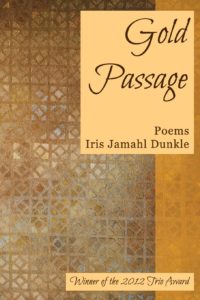 Review by Lisa Cheby
Review by Lisa Cheby
– Good poetry, like a good sermon, finds a balance between wisdom and humility, between insight and struggle, to bring the painful into the light so we can see its beauty. Iris Jamahl Dunkle is not afraid of getting dirty; not kinky dirty, but a kind of digging in the garden dirty, of excavating our emotional skeletons and roots dirty: “Dig and dig until all the bones are found” (70). In her Trio Award Winning book Gold Passage, Dunkle serves up the roots and bones negotiating how to be human in organic forms that leave her readers both satiated and challenged to keep digging into their own backyards.
Like the performers in the title poem, Dunkle’s poetry is imbued with a pioneering spirit that wants to uncover the inspiration beneath our desires and our demons: “What illumines our path forward is what once consumed us” (63). There is a mystery to many of the poems in Gold Passage, yet she does not let the ambiguity distance us. Rather, there is the distinct feeling Dunkle is there with us in the mystery; she is not smirking from the other side, but trying to figure it out with us. The opening poem sets a tone of invitation as the speaker asks us to imagine another version of what we think we know and see, “a life that’s visible we can reconstruct” (13). In closing this invitation, Dunkle establishes the speaker of many of these poems as both the story and the storyteller, “I am an alphabet of bones, / my own telling” (13). Hence, we are invited into the unknown, a scary place to venture alone, but the place that is necessary to see more clearly, to know a deeper joy.
On this expedition to someplace we do not yet know, Dunkle packs in and employs many tools, particularly sound and form. Neither a formalist nor a language poet, Dunkle exemplifies the skill of listening to a poem and allowing it to blossom in its own form. “After Elegy,” is written in the form and language of html code imitating how we try to impose logic on emotions as a way to sort and cope, particularly in grief. Likewise, the code opens language and poetry to new expressions. One example is how the code requires and opening and closing of instructions, so the poem opens with the “<body>” and closes with the ending of that, “</body>” both visually and linguistically representing birth and death. Likewise, the sounds of her words create images that sing, such as these lines from “Bobcat,”
My matter is never freed
from urban tongue and lure.
I pace my house, plot escape,
jump at whistles of tea kettles,
the screams of time’s alarms
while the bobcat freely looms.
A somewhat iambic meter underscores the melody that starts with the u sounds in the line and moves through the alliterative “pace” and “plot” to the more urgent consonance of the s’s through the remaining lines that contrast with the contented m’s of the bobcat’s freedom.
In a lesson I found to assist students in preparing a poem for recitation, they are asked to find the emotional arc of the poem, to not get too bogged down in the narrative. Dunkle’s collection carries us on a journey of the heart, one that works to demystify the door between the self and the poem (14, 16). As the poems meander, they bear witness and preserve artifacts for later understanding and for guidance to the often unclear destination, “In these truths, we find our edges: the lines of purpose that surface/ even in this fog, these clouds of witness” (72). Yet, the truth is often hidden within the brambles of life:
Time will chip and pick at each façade
and sea will comb and comb
the grey wool of memory
until it is freed of knots. (46)
It is this combing, this searching and working through that lifts Dunkle’s poems into the sublime.
In writing this review, the challenge was choosing which of the many superb elements to write about. The book is imbued with the struggles between faith and science, emotion and reason. Then there is the wonderful use of nature as a teacher and guide, providing the lush sensory landscape of the poems. Even as I reread poems to compose this, I get lost in the reading and forget about my goal to finish this review, which really is all I need to say as the job of poetry is to ask us to stop, to set aside our to-do lists, and just be.
The final poem is the “The Gift” where the speaker longs to “speak a word that could read the other side” as she passes an earlier version of the self. This book is those words and the reader is the other self. Listen. Learn. Love. Accept this gift.
Gold Passage
by Iris Jamahl Dunkle
Trio House Press, 2013
87 pages
Lisa Cheby has an MFA from Antioch University and a forthcoming chapbook, Love Lessons from Buffy the Vampire Slayer, from Dancing Girl Press. Lisa is a high school librarian and is the poetry editor for Annotation Nation. Her poems and reviews have appeared in various journals including The Rumpus, Eclipse, The Mom Egg, The Citron Review, The Provo Orem Word, Askew, The Splinter Generation, and Tidal Basin Review. For more information visit her website: http://lisacheby.wordpress.com/
